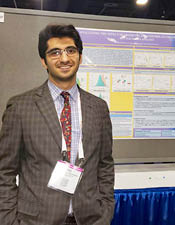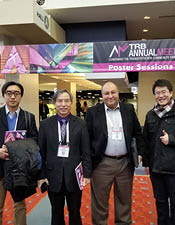Overview of 2023 Mid-America Transportation Center (MATC) Consortium Members
Besides UNL, the member institutions that comprise the 2023 MATC consortium include University of Iowa, University of Kansas, Nebraska Indian Community College, University of Missouri-St. Louis, and Missouri University of Science and Technology. Consortium members have excellent facilities and significant resources that are essential to completing MATC's research and education goals. The combined resources of the MATC consortium members include major research libraries, state-of-the art computer facilities, laboratories, and office space. In addition, university staff members help efficiently administer MATC projects and activities across the consortium.
MATC has access to a unique, comprehensive set of multi-modal research and testing facilities. A wide range of research has been conducted with these facilities and sponsored by various public and private agencies. A description of each facility is provided below.

The University of Nebraska-Lincoln (UNL) is the primary research and doctoral degree-granting institution in Nebraska. As Nebraska's land-grant university, it serves as the flagship institution of the University of Nebraska system. UNL has extensive experience in federal- and non-federal-sponsored research, as evidenced by its annual submission and receipt of grants in excess of $150 million. MATC's core initiatives of research, education, and tech transfer are well-served with access to state-of-the-art Intelligent Transportation Laboratory, Structural Laboratory, Geomaterials Laboratory, and the Midwest Roadside Safety Facility's outdoor proving grounds at the Lincoln Airport.

University of Missouri-St. Louis Supply Chain & Analytics (SC&A) Department has the state-of-the-art high-performance computing (HPC) equipment available for conducting optimization modeling, computational algorithms, and simulation for this project. For instance, the Lewis cluster at the University of Missouri System is a HPC luster that consists of 225 compute nodes and 8544 compute cores. Several HPC servers are also available at the SC&A Department for data storage, sharing, and development and implementation of optimization and simulation models in this project. The SC&A Department hosts two research centers: the Laboratory for Advanced Supply Chain Analytics (LASCA) and the Supply Chain Risk and Resilience Research Institute (SCR3), who conduct cutting-edge applied research including supply chain network design and configuration, agribusiness supply chain, last-mile delivery with drones, and supply chain risk prediction and mitigation. A complete suite of software is available for the analytical work in this project, including ArcGIS Pro for data visualization, Gurobi, GAMS and Matlab for optimization modeling and algorithms, SPSS, and SAS for predictive analytics, and Simio for simulation.

The Department of Civil, Architectural, and Environmental Engineering at the Missouri University of Science and Technology (Missouri S&T) has a broad-based program with seven emphasis areas, including structures, geotechnical engineering, construction, materials, transportation, environmental engineering, and hydraulics. Missouri S&T research activities related to infrastructural engineering and intelligent systems are coordinated by several research centers. The umbrella organization, the Center for Intelligent Infrastructure (CII), plays a significant role in the execution of initiatives within transportation infrastructure areas. The primary research areas developed over the years include existing structure rehabilitations, load test bridge assessment, non-destructive evaluation, the monitoring technologies, and robot-based inspection and maintenance for civil infrastructure. In addition to research capabilities, Missouri S&T has a strong education outreach program with ongoing K-12 programs.

The Civil and Environmental Engineering Department at the University of Iowa (UI) comprises faculty members who contribute to enhancing roadway safety, optimizing bridge designs, and addressing freight-related risks. In collaboration with the Tippie College of Business, the department investigates emergency response strategies within the transportation sector. UI is home to the Driving Safety Research Institute (DSRI), formerly the National Advanced Driving Simulator. DSRI facility is crucial in advancing transportation safety research to reduce accidents and enhance road safety nationwide. Furthermore, the Iowa Institute of Hydraulic Research (IIHR) specializes in hydraulic engineering, fluid dynamics, and environmental science. Researchers at IIHR focus on critical areas such as flood prediction and the impact of water-related challenges on the transportation sector. Their work contributes to innovative solutions that benefit society as a whole.

The University of Kansas (KU) fosters cross-disciplinary research in emerging transportation issues that have broad significance. KU is home to the University of Kansas Transportation Center (KUTC), which conducts, coordinates, and promotes transportation training, technology transfer, and research to the State of Kansas and the surrounding region. The KUTC is a multi-disciplinary center of the University of Kansas operating since 1977, managing technology transfer and research programs. Primary areas of interest are highway engineering and maintenance, traffic engineering and safety, transportation workforce development, and community transit. The Center’s three primary programs are Kansas LTAP, Kansas RTAP, and the Kansas Local Field Liaison Program. Campus researchers and graduate students participate in research across related disciplines with colleagues from other universities and public transportation entities.

The University of Kansas Medical Center (KUMC) is nationally recognized for providing exceptional education to health care professionals and for the many centers and institutes it houses. KUMC includes three schools: the School of Medicine, with campuses in Kansas City, Witchita, and Salina; the School of Nursing; and the School of Health Professions. The campus is shared with the University of Kansas Hospital.

Nebraska Indian Community College (NICC) is a two-year community tribal college located in Macy, Nebraska, which provides a high level of education, community-focused learning, and cultural preservation to students belonging to the UmóNhoN (Omaha) and Isanti (Santee Dakota) Nations and other learners. NICC is equipped to play an integral part in MATC’s education and workforce development initiatives. NICC serves as liaison to other community colleges in Region VII and to tribal colleges throughout the U.S. MATC partners with NICC for the Scholars Program held in the fall to assist Native American undergraduates with transitioning from two-year to four-year institutions. Several NICC faculty members joined additional guest speakers in leading sessions for Native American undergraduates about transitioning from two-year to four-year institutions.

Courtesy of Shelley Bhattacharya



Courtesy of Irtiza Khan


Courtesy of Missouri S&T